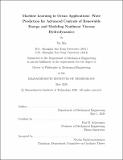| dc.contributor.advisor | Paul D. Sclavounos. | en_US |
| dc.contributor.author | Ma, Yu,Ph. D.Massachusetts Institute of Technology. | en_US |
| dc.contributor.other | Massachusetts Institute of Technology. Department of Mechanical Engineering. | en_US |
| dc.date.accessioned | 2020-09-03T17:44:43Z | |
| dc.date.available | 2020-09-03T17:44:43Z | |
| dc.date.copyright | 2020 | en_US |
| dc.date.issued | 2020 | en_US |
| dc.identifier.uri | https://hdl.handle.net/1721.1/127057 | |
| dc.description | Thesis: Ph. D., Massachusetts Institute of Technology, Department of Mechanical Engineering, May, 2020 | en_US |
| dc.description | Cataloged from the official PDF of thesis. | en_US |
| dc.description | Includes bibliographical references (pages 144-150). | en_US |
| dc.description.abstract | Many conventional problems in ocean engineering remain challenging due to the stochastic nature of ocean waves, viscous effects of the flow, nonlinear resonance, etc., and the combination of these factors. Data-driven techniques is an prospective approach complementary to traditional methods to model physical problems since data from experiments, field tests or high-fidelity simulations are mostly informative about actual physical systems. Machine learning algorithms, especially kernel based methods have very good generalization capability as well as statistical inference. This thesis targets to establish a framework that how we can use data from real-time measurements or data gathered from experiments and field tests and simulations to provide an alternative approach for physical modeling or practical engineering solutions. | en_US |
| dc.description.abstract | In this thesis, we mainly target two different types of problems-mapping highly nonlinear physical relations and predicting time series, to prove the feasibility of such a framework. More specifically, one problem is the short-term wave prediction based on realtime measurements and its application to the advanced controls of renewable energy. The other one is the modeling of nonlinear viscous hydrodynamic loads of ships and offshore platforms. The Support Vector Machines (SVM) is used in solving both the problems. In the thesis, the SVM regression model are developed for the realtime short-term forecast of wave elevations and wave excitation forces. Optimal controllers aiming to reduce the structural loads or optimize energy capture with the knowledge of the forecasted wave force are established for offshore floating wind turbines and wave energy converters. | en_US |
| dc.description.abstract | A series of CFD simulations of a rectangular barge with bilge keels are conducted and validated, along with the experiment data of a fixed offshore cylindrical platform, to serve as the baseline data set to model the nonlinear viscous hydrodynamic loads. Using the wave elevations and ship roll kinematics as features, the SVM regression models are trained and tested to predict the nonlinear hydrodynamic loads. The influence of the stochastic effect and different feature selections and kernel selections are discussed in the thesis as well. Key words: Machine learning, SVM regression, short-term forecast, model predictive control, nonlinear viscous hydrodynamic loads | en_US |
| dc.description.statementofresponsibility | by Yu Ma. | en_US |
| dc.format.extent | 150 pages | en_US |
| dc.language.iso | eng | en_US |
| dc.publisher | Massachusetts Institute of Technology | en_US |
| dc.rights | MIT theses may be protected by copyright. Please reuse MIT thesis content according to the MIT Libraries Permissions Policy, which is available through the URL provided. | en_US |
| dc.rights.uri | http://dspace.mit.edu/handle/1721.1/7582 | en_US |
| dc.subject | Mechanical Engineering. | en_US |
| dc.title | Machine learning in ocean applications : wave prediction for advanced controls of renewable energy and modeling nonlinear viscous hydrodynamics | en_US |
| dc.title.alternative | Wave prediction for advanced controls of renewable energy and modeling nonlinear viscous hydrodynamics | en_US |
| dc.type | Thesis | en_US |
| dc.description.degree | Ph. D. | en_US |
| dc.contributor.department | Massachusetts Institute of Technology. Department of Mechanical Engineering | en_US |
| dc.identifier.oclc | 1191716449 | en_US |
| dc.description.collection | Ph.D. Massachusetts Institute of Technology, Department of Mechanical Engineering | en_US |
| dspace.imported | 2020-09-03T17:44:43Z | en_US |
| mit.thesis.degree | Doctoral | en_US |
| mit.thesis.department | MechE | en_US |
